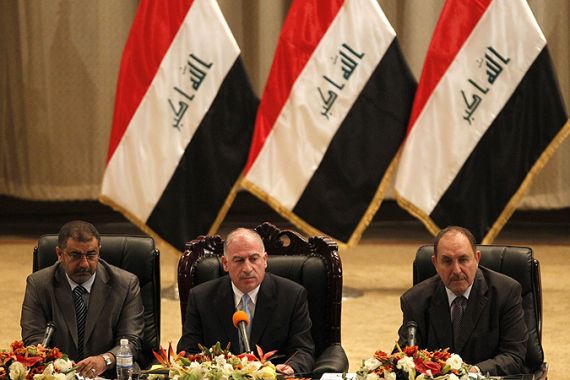Iraq pact heralds new political era
In power-sharing agreement, Nouri al-Maliki continues as prime minister and Jalal Talabani remains president.

 |
| Iraq’s fractious politicians have apparently ended a deadlock that raised fears of renewed sectarian war [Reuters] |
During a late-night session of the Iraqi parliament, politicians have returned Jalal Talabani to the largely ceremonial post of president and voted to make Osama al-Nujaifi, a Sunni Arab member of the Iraqiya coalition, the new speaker of parliament.
As expected, Talabani, the leader of the Kurdish alliance, nominated al-Maliki to serve another term as prime minister.
After Thursday’s developments, al-Maliki now has a month to form a cabinet and present his government to parliament for a vote.
In Iraq’s March 7 election, the Iraqiya list, led by the former prime minister, Iyad Allawi, won two more seats than al-Maliki’s State of Law coalition, but neither side won a majority, leading to eight months of political deadlock.
But just hours after leaders cemented the power-sharing agreement that seemed to smooth over lingering ethno-sectarian tensions, politicians belonging to Iraqiya left parliament.
A walkout was staged after al-Nujaifi declined a request to vote on removing three parliament members’ names from a list of those associated with deposed president Saddam Hussein’s Baath party.
Parliamentary instability
Politicians claimed that removing the names listed by a “de-Baathification” committee was part of a broad power-sharing agreement that all sides in Iraq’s ongoing political dispute had agreed upon, Rawya Rageh, Al Jazeera’s correspondent in Baghdad, said.
“The new speaker observed that there was a lack of confidence about the sessions,” she said.
Al-Nujaifi, a member of Iraqiya who on Thursday was elected by his colleagues as speaker of parliament, would not allow the de-Baathification vote to occur until politicians chose a president.
But he declared that his loyalty was to Iraq’s parliament and no longer just to the Iraqiya list.
After Iraqiya members began the walkout, Al-Nujaifi joined them and left his two deputies – also just elected – to lead the session, Rageh said.
Allawi, who under the unity deal is expected to head up a new security council, also walked out. Al-Nujaifi eventually returned to the chamber.
The power-sharing deal, clinched after three days of heated talks, stipulated that a Sunni be speaker, and that al-Maliki and Talabani retain their posts.
The agreement established a statutory body to oversee security as a gesture to Allawi, who had held out for months to take the job from al-Maliki.
Iraqiya’s conditions
Iraqiya has said its participation hinged on four conditions: a bill forming the security body; a committee examining cases against political detainees; codification of the power-sharing deal; and annulment of the bans against the three Iraqiya members.
Iraqiya, a cross-sectarian political bloc, expressed hope it “would not be obliged to change its decision to participate in the political process if these conditions are not met”.
Despite receding Shia-Sunni violence, the long parliamentary deadlock has fuelled tension as US forces prepare to withdraw in 2011.
The backing of Iraqiya was seen as vital to preventing a resurgence of violence.
A series of attacks on Christian targets across Baghdad on Wednesday stirred renewed fear in the minority community.
The bomb and mortar blasts occurred just 10 days after a bloody siege at a Catholic cathedral in the capital that killed 52 people.